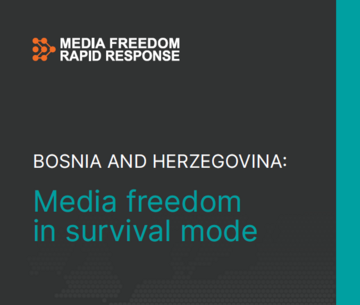Last October , OBCT participated in a three-day fact-finding mission to Bosnia and Herzegovina together with MFRR partner organisations Article 19 Europe, the European Centre for Press and Media Freedom (ECPMF), the European Federation of Journalists (EFJ), Free Press Unlimited (FPU), the International Press Institute (IPI) and a representative of the South East Europe Media Organisation (SEEMO).
During their visit, which was coordinated by the Journalists’ Association BH Novinari, the international delegation met with several political and media stakeholders in Banja Luka (Republika Srpska - RS) and Sarajevo, with whom they addressed some key concerns regarding media freedom in the country , including worrying legislative developments in RS, the growing number of acts of intimidations against journalists and the fragile situation of the public broadcaster BHRT.
Today, representatives of the MFRR delegation presented the full report of the fact-finding mission in a webinar hosting Maja Sever, President of the European Federation of Journalists (EFJ), and Frane Maroevic, Executive Director of the International Press Institute.
The report provides a detailed overview of the findings from the three-day mission and it covers three key points: the package of restrive laws both in RS and in the Sarajevo canton, journalists’ safety, and the situation of public service media and the regulatory framework.
As pointed out by Frane Maroevic, Bosnia and Herzegovina has long had one of the most progressive legal frameworks on media freedom in the entire region. In 2001 for example, Bosnia and Herzegovina was the first country to de-criminalise defamation, a reform that signaled an important step forward for protecting press freedom. What we have witnessed in recent years, however, is a continued overturn of all these progressive steps: political influence over the media sector has risen, showing a clear attempt by the ruling parties at regulating and restring freedom of expression. The re-introduction of the crime of defamation in RS last year is clear evidence of this alarming trend.
“While regulations are very much needed in the media sector, they must comply with European and International standards to protect freedom of speech and human rights, as key components of democracy and the rule of law”, stressed Maroevic.
From her side, Maja Sever drew attention to the growing concerns regarding the safety of journalists and the large number of acts of intimidation, including verbal and physical attacks: “The legacy of impunity is concerning, especially in RS, where journalists have come to distrust the police to ensure their protection”.
Last but not least, Sever warned about the critical condition of the public broadcaster BHRT: the economic crisis that has affected the state-level public broadcaster has degenerated in the first weeks of 2024 and now “the shutdown is more certain than ever. If this was ever to happen, BiH would be the only European country without a public broadcaster”.
In their report, MFRR partner organisations have elaborated a set of recommendations addressed to Republika Srpska authorities, state, entity, and district authorities, and the international community. To translate these recommendations into concrete steps and actions, partner organisations will continue their advocacy work to put pressure on authorities at all levels and make sure that media freedom and freedom of expression remain high on the political agenda of the country.
The full report of the MFRR fact-finding mission is available at this link:
Tags: Bosnia Herzegovina Media freedom Freedom of expression AdvocacyThe content of this article can be used according to the terms of Creative Commons: Attribution-NonCommercial 4.0 International (CC BY-NC 4.0) . To do so use the the wording "this article was originally published on the Resource Centre on Media Freedom in Europe" including a direct active link to the original article page.


